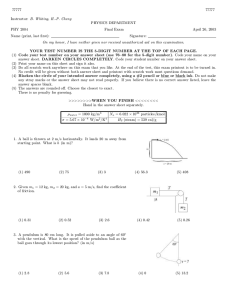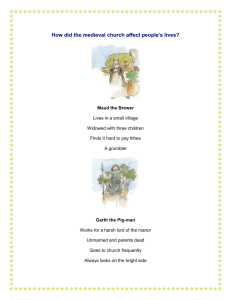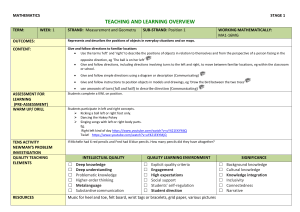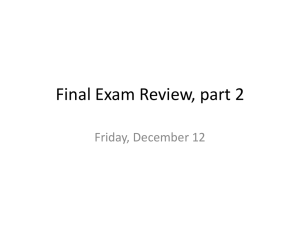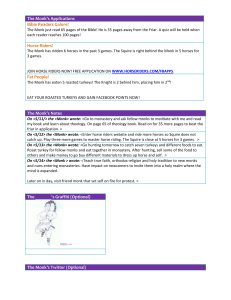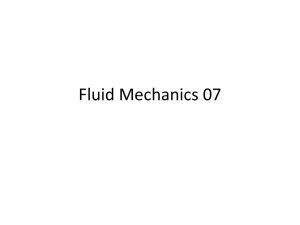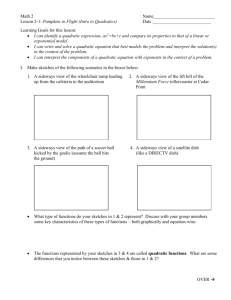Blocks Activities - Trinity University
advertisement
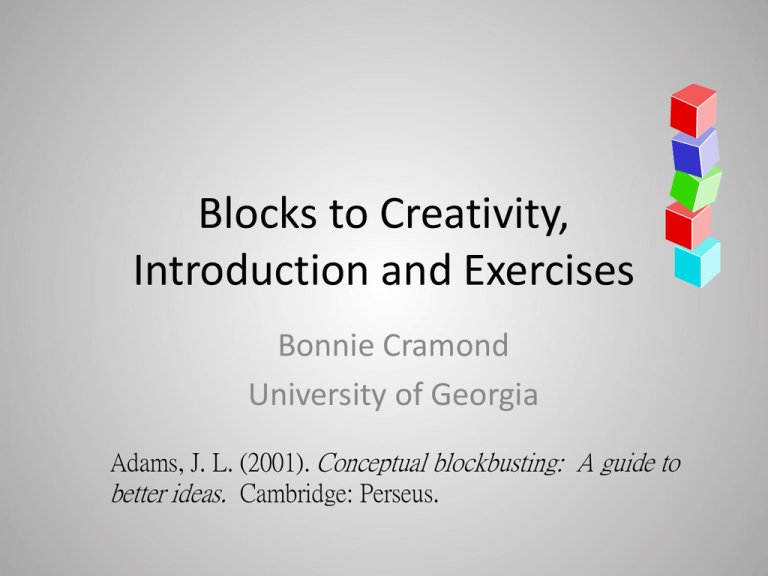
Blocks to Creativity, Introduction and Exercises Bonnie Cramond University of Georgia Adams, J. L. (2001). Conceptual blockbusting: A guide to better ideas. Cambridge: Perseus. Creativity Helps Us Solve Problems • For example, one problem is to kill cancer cells in a hard-to-reach place without killing surrounding tissue. • Cutting a tumor out destroys nearby tissue. • Using a laser beam that is strong enough to destroy the cancer cells will also destroy adjacent healthy tissue. Problem: How to kill hard-to-reach cancer cells in the brain without damaging surrounding tissue. Solution: Gamma Knife: Painless, Noninvasive, Low-Risk Explanation: By focusing hundreds of weak Gamma rays on a tumor in the brain, the concentrated radiation can kill cancer cells. However, the individual rays are too weak to damage adjacent tissues. Becoming Aware of Blocks • The next few slides have eight activities that can help you become aware of some typical blocks to thinking creatively and problem solving. • Please try each activity with your group, record your responses, then we will view the solution slide show. • If you already know the solution, or think you know the solution, don’t spoil it for others. Try to think of an alternative solution. Warmup--Activity 1 Read this aloud and fill in the blank Peter Peter Pumpkin Eater had a wife and couldn’t keep her, he put her in a pumpkin shell and and there he kept her very_____. Activity 2 • Draw no more than 4 straight lines • without lifting your pencil from the paper • cross through every dot just once . . . . . . . . . Activity 3: Use 6 Pencils to Make 4 Equilateral Triangles • Use the 6 pencils to create 4 equilateral triangles (equal sides, equal angles) • The ends of the pencils create the angles • Don’t break the pencils Activity 4 A general wants to send his army in a surprise attack on the enemy camp. However, if he sends the whole army in, they will be noisy and lose the element of surprise. If he only sends part of the army in, they may be quiet, but they will be outnumbered. What could he do? Activity 5 Can you pick the right penny without looking at one? 1 4 2 5 3 6 How about now? Can you pick the right penny without looking at a real one? Activity 6 • • Imagine that you are one of a group of six people in a bare room. A steel pipe is stuck vertically in the concrete floor with a ping-pong ball lying at the bottom of the pipe. The inside diameter of the pipe is just slightly larger than the diameter of the ping-pong ball. 100 feet of clothesline, a wire coat hanger, a carpenter’s hammer, a monkey wrench, a chisel, a box of cereal, a file, and a light bulb Your task is to get the ball out of the pipe without damaging the ball, tube, or floor. How many ways can you think of to do this? Act. 7: Paper Folding • • • • • • • • • • Imagine a sheet of notebook paper, 8.5” X 11” Now, imagine folding it in half, Again Again Again Again Again Again Again Now, how many sheets thick is the paper? Act. 8 Buddhist Monk • A monk leaves to climb a mountain at 6:00 am one morning along the only path to the top. • Along the way, he stops to rest, pray, or take refreshments from time to time. • He gets to the top at 6:00 p,m Act. 8 Buddhist Monk (cont’d) • When he reaches the top of the mountain, her sups, then prays and sleeps. • The next day, he leaves the top of the mountain at 6:00 am to walk down the same path. Again, along the way, he stops to rest, pray, or take refreshments from time to time. • He gets to the bottom at 6:00 pm Act. 8 Buddhist Monk (cont’d) • Must there be a spot that he passes at the same time on both days? • You need not tell where or when, just if. • Can you prove your answer?
